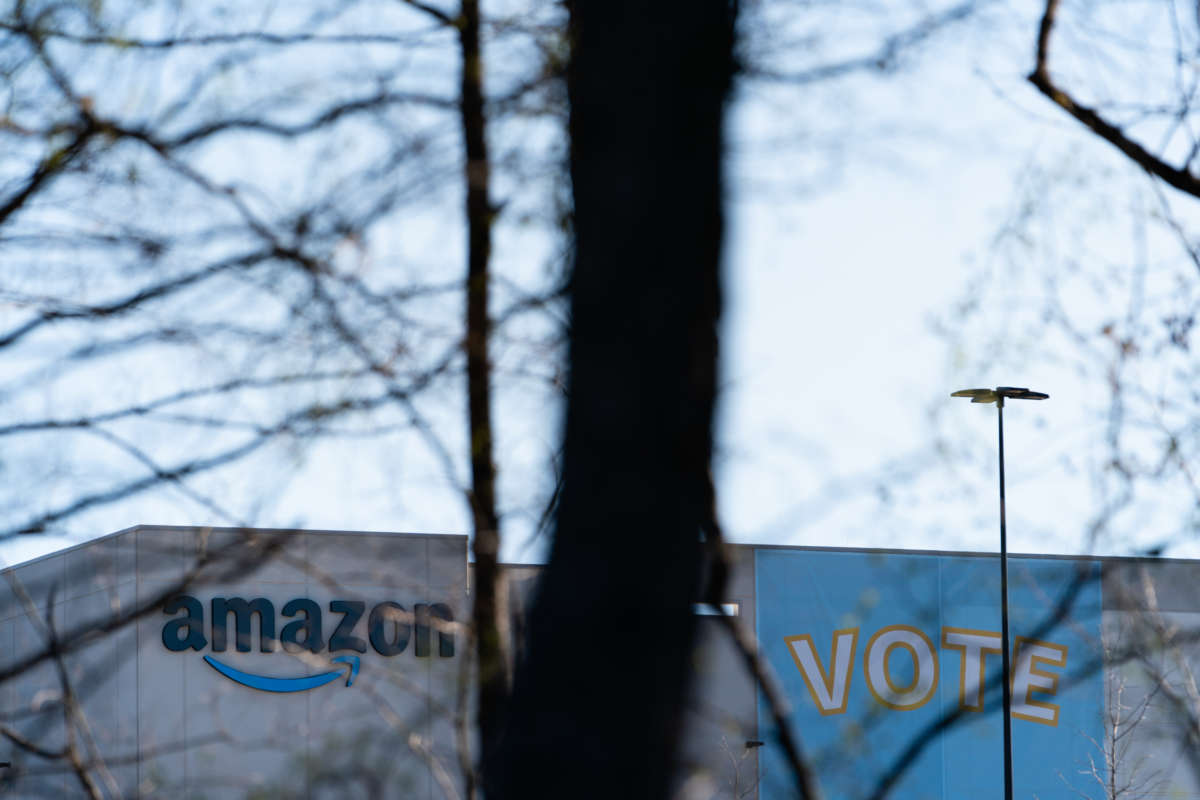Truthout is a vital news source and a living history of political struggle. If you think our work is valuable, support us with a donation of any size.
The Retail, Wholesale and Department Store Union (RWDSU) has filed new “precedent setting” charges of misconduct against Amazon with the National Labor Relations Board (NRLB), which previously ruled that the company violated the labor rights of its employees at the Bessemer warehouse in Alabama last year.
Bessemer workers are currently voting on whether to join a retail union for a second time after the NLRB determined that Amazon illegally interfered with a closely watched election in April 2021. The original union vote was unsuccessful, but organizing at the Bessemer warehouse and Amazon facilities in New York and Canada continued despite pushback from the retail giant.
“Removing union literature from break rooms, limiting workers’ ability to talk with each other, compelling attendance at captive audience meetings to listen to anti-union messages — all of these actions expose Amazon’s undisguised efforts to stifle workers’ voices and its contempt for their rights to join together,” said Wilma Liebman, a former chairperson for the NLRB, in a statement provided by RWDSU.
Amazon workers involved in organizing said the company took down pro-union flyers that they put up next to anti-union fliers during their unpaid time off, as they are allowed to do under labor laws. Roger Wyatt, a member of the organizing committee for workers, said workers were forced to attend “training” meetings with anti-union messaging.
“Being forced to attend the captive-audience anti-union trainings was degrading,” Wyatt said in a statement released by RWDSU. “Amazon treated us like mindless robots, downloading misinformation to us. And the irony is, these meetings are the longest I’ve ever gotten to sit at work.”
In a statement to Reuters, an Amazon spokeswoman said the company is confident that it has not broken labor laws. “Our focus remains on working directly with our team to make Amazon a great place to work,” the company said.
Meanwhile, local support for the Bessemer union is strong. Nearly two-thirds of residents in Jefferson County, Alabama, say they support a union at the Amazon warehouse in Bessemer. A survey of 1,000 county residents released on Thursday found that 62 percent supported a union at the warehouse, including 78 percent of Black respondents and 79 percent of Black women. About 85 percent of the Amazon warehouse’s employees are Black, and Black workers are leading the union drive, according to the Institute for Policy Studies, a think tank that commissioned the survey.
The survey released Thursday included broader questions about economic and social justice issues along with questions about the union drive at the Amazon warehouse, a major employer in the area. The labor movement has traditionally struggled to build popular support and win union elections in the South compared to other regions, but nearly 50 percent of white respondents said they support a union at the massive Amazon warehouse.
“Even in the heart of the right-to-work U.S. South, there is amazing potential for an energized and revitalized labor movement to score major victories and improve the lives of Alabama workers,” said Marc Bayard, director of the Black Worker Initiative at the Institute for Policy Studies. “This survey shows that local community members stand with unionization efforts at Amazon facilities in Jefferson County, despite misinformation campaigns.”
Workers at the Bessemer warehouse can cast ballots in the current union election until late March. If enough workers vote to join the union, the warehouse will be the first Amazon facility to unionize in the country, potentially setting the stage for others to follow.
“What’s Amazon afraid of?” Liebman added.
A terrifying moment. We appeal for your support.
In the last weeks, we have witnessed an authoritarian assault on communities in Minnesota and across the nation.
The need for truthful, grassroots reporting is urgent at this cataclysmic historical moment. Yet, Trump-aligned billionaires and other allies have taken over many legacy media outlets — the culmination of a decades-long campaign to place control of the narrative into the hands of the political right.
We refuse to let Trump’s blatant propaganda machine go unchecked. Untethered to corporate ownership or advertisers, Truthout remains fearless in our reporting and our determination to use journalism as a tool for justice.
But we need your help just to fund our basic expenses. Over 80 percent of Truthout’s funding comes from small individual donations from our community of readers, and over a third of our total budget is supported by recurring monthly donors.
Truthout has launched a fundraiser to add 310 new monthly donors in the next 4 days. Whether you can make a small monthly donation or a larger one-time gift, Truthout only works with your support.
